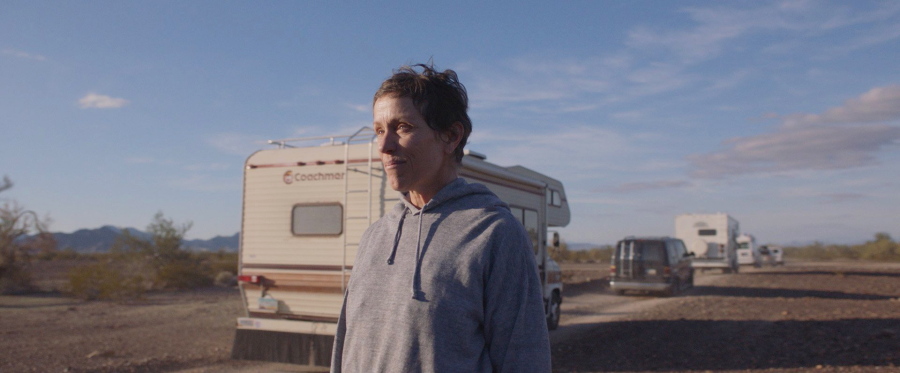Following an outcry over the lack of diversity in last year’s nominees and an overhaul of its rules and regulations, the EE British Film Academy Awards on Tuesday unveiled a far more inclusive field of nominees, including record nods for female directors and a leading seven nominations for Chloe Zhao’s “Nomadland” and Sarah Gavron’s “Rocks.”
Much like previous Academy Awards controversies, last year’s nominations by the British Academy of Film and Television Arts spawned a #BaftasSoWhite hashtag and were denounced for their all-male directing nominees and all-white acting nominees. Director Steve McQueen said the BAFTAs — Britain’s equivalent of the Oscars — risked irrelevancy. After winning for his performance in “Joker,” Joaquin Phoenix said he felt “conflicted” even accepting the award.
The British academy responded with a seven-month review. It expanded membership, mandated unconscious bias training for its 6,700 voting members, grew the number of nominees in numerous categories and changed the nomination process to include a longlist phase. Acting categories were selected in part through juries. Watching all longlisted films were compulsory viewing. And the longlisted directing field was divided equally between women and men.
The results on Tuesday made for a radically different BAFTAs. The leading vote-getters were Zhao’s drama about a middle-aged woman (Frances McDormand) who travels the American West while living out of her van, and Gavron’s coming-of-age tale about a Black British teenage girl (Bukky Bakray) in London.
Four of the six directing nominees are women, including Zhao, Gavron, Shannon Murphy (“Babyteeth”) and Jasmila Zbanic (“Quo Vadis, Aida?”). Also nominated are Lee Isaac Chung for the family drama “Minari” and Thomas Vinterberg for the Danish dark comedy “Another Round.”
More films were nominated, too. A total of 50 films were nominated, up from 39 last year. Amanda Berry, chief executive of BAFTA, said in a video interview that one of the most important parts of the academy’s overhaul was getting members to watch more than just the most hyped movies. Despite the pandemic, a total of 258 films were entered into this year’s BAFTAs, which the academy said were watched more than 150,000 times through its online platform.
“Hundreds of people were involved in that review. Out of it came a 120 changes that we’ve made across the organization,” said Berry. “But one of the biggest pieces of feedback was that the feeling was that not enough people were watching enough films.”
Nominated for best film are: “Nomadland,” Florian Zeller’s dementia drama “The Father,” Kevin Macdonald’s Guantanamo Bay drama “The Mauritanian,” Emerald Fennell’s pitch-black revenge comedy “Promising Young Woman” and Aaron Sorkin’s 1960s courtroom drama “The Trial of the Chicago 7.”
Up for lead actress are: Bakray, McDormand, Radha Blank (“The Forty-Year-Old Version”), Vanessa Kirby (“Pieces of a Woman”), Wunmi Mosaku (“His House”) and Alfre Woodard (“Clemency”). Up for lead actor are Riz Ahmed (“Sound of Metal”), Chadwick Boseman (“Ma Rainey’s Black Bottom”), Adarsh Gourav (“The White Tiger”), Anthony Hopkins (“The Father”), Mads Mikkelsen (“Another Round”) and Tahar Rahim (“The Mauritanian”).
The nominations left out some notable performances that have been nominated elsewhere, including Carey Mulligan (“Promising Young Woman”), Viola Davis (“Ma Rainey”), Sacha Baron Cohen (snubbed for both “Borat Subsequent Moviefilm” and “The Trial of the Chicago 7”), Andra Day (“The United States vs Billie Holliday”) and both Gary Oldman and Amanda Seyfried from “Mank.”
The nominees for most outstanding British film — a category expanded to 10 — are: “The Dig,” “The Father,” “Calm With Horses,” “His House,” “Limbo,” “The Mauritanian,” “Mogul Mowgli,” “Promising Young Woman,” “Rocks” and “Saint Maud.”
The BAFTAs will be held virtually this year from London’s Royal Albert Hall and split between two broadcasts on April 10 and 11.



